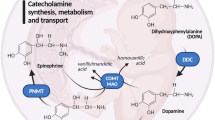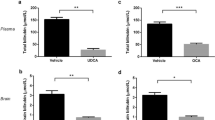Abstract
CONJUGATION with glucuronic acid is the major pathway in vertebrates by which harmful organic compounds are detoxicated. It ensures the excretion of excess endogenous compounds such as steroid hormones, catecholamines and bilirubin, and of a great range of toxic xenobiotics such as drugs, pesticides, industrial pollutants and their metabolites1. Glucuronidation, however, is virtually absent in the early mammalian foetus and approaches adult levels only in the perinatal period, putting the foetus and newborn at considerable risk from unwise medication or exposure to environmental contaminants. This susceptibility has been demonstrated frequently, often with fatal results2,3. Defective glucuronidation of endogenous bilirubin is a major cause of human neonatal jaundice and can lead to infant death4. Attempts have been made to induce the responsible microsomal enzyme(s), UDP-glucuronyltransferase (EC 2.4.1.17), in cases of prematurity, genetically defective enzyme formation or poisoning by glucuronidogenic compounds; administration of xenobiotic inducers such as phenobarbital has had limited success in neonates and the term foetus2–5. Adequate treatment of such conditions, however, requires knowledge of endogenous compounds which induce the enzyme perinatally. We report here the first evidence in foetal mammalian tissue of precocious development of UDP-glucuronyltransferase activity and of overall glucuronidation brought about by known compounds of endogenous nature. These findings provide insight into the perinatal development of this important enzyme.
This is a preview of subscription content, access via your institution
Access options
Subscribe to this journal
Receive 51 print issues and online access
$199.00 per year
only $3.90 per issue
Buy this article
- Purchase on Springer Link
- Instant access to full article PDF
Prices may be subject to local taxes which are calculated during checkout
Similar content being viewed by others
References
Dutton, G. J. Glucuronic Acid (ed. Dutton, G. J.) 185–299 (Academic, New York, 1966), Handb. exp. Pharmac. 28 (2), 378–400 (1971).
Wilson, J. T. A. Rev. Pharmac. 12, 423–450 (1972).
Yaffe, S. J. and Juchau, M. A. Rev. Pharmac. 14, 219–237 (1974).
Lathe, G. H. Essays Biochem. 8, 107–148 (1972).
Burchell, B. and Dutton, G. J. Biol. Neonate 26, 122–128 (1975).
Leakey, J. E. A., Wishart, G. J. and Dutton, G. J. Biochem. J. 158, 419–426 (1976).
Zarrow, M. X., Philpott, J. E. and Denenberg, V. H. Nature 226, 1058–1059 (1970).
Wong, M. D., Thomson, M. J. and Burton, A. F. Biol. Neonate 28, 12–17 (1976).
Holt, P. G. and Oliver, I. T. Biochem. J. 108, 339–341 (1968).
Cohen, A. and Brault, S. C. r. Acad. Sci. Paris 278, 1755–1758 (1974).
Dupouy, J. P., Coffigny, H. and Magre, S. Endocrinology 65, 347–352 (1975).
Author information
Authors and Affiliations
Rights and permissions
About this article
Cite this article
WISHART, G., DUTTON, G. Precocious development of foetal glucuronidating enzymes induced by glucocorticoids in culture and in utero. Nature 266, 183–184 (1977). https://doi.org/10.1038/266183a0
Received:
Accepted:
Issue Date:
DOI: https://doi.org/10.1038/266183a0
Comments
By submitting a comment you agree to abide by our Terms and Community Guidelines. If you find something abusive or that does not comply with our terms or guidelines please flag it as inappropriate.



